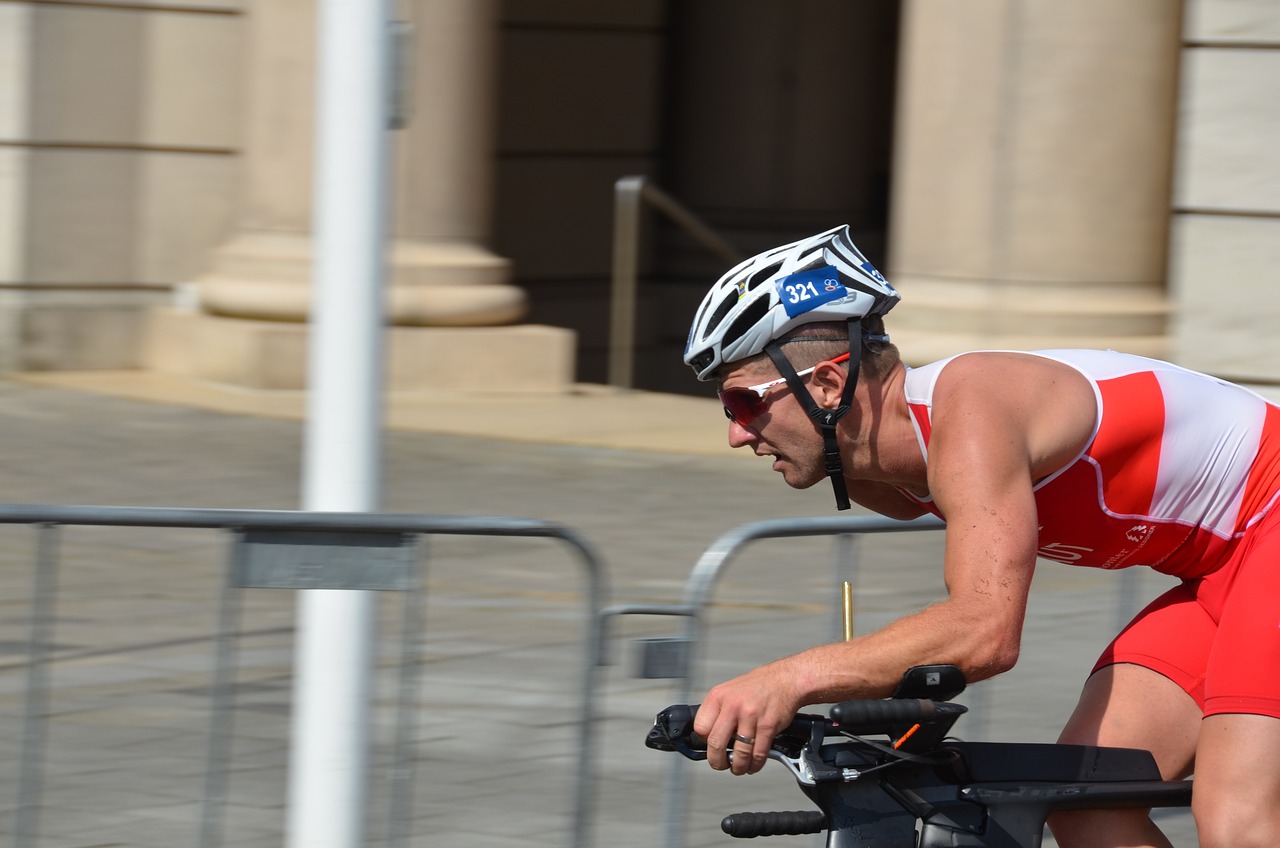If you’re a committed triathlete who races a lot during the competitive season, it’s not if you’ll have a bad race, but, more likely, when you’ll have a bad race. Unsatisfactory races can happen for all kinds of objective reasons: lack of sleep, life stress, poor hydration or nutrition, a mechanical failure, poor tactics or pacing, not knowing the course, or just when the almighty triathlon gods decide that you need to learn a lesson that will help you in the future. Bad races can also be about your subjective perception of the race rather than its reality. For example, you feel that you had a bad race because you didn’t achieve a time goal that you were aiming for or you got beat by someone whom you had wanted to be faster than.
mechanical failure, poor tactics or pacing, not knowing the course, or just when the almighty triathlon gods decide that you need to learn a lesson that will help you in the future. Bad races can also be about your subjective perception of the race rather than its reality. For example, you feel that you had a bad race because you didn’t achieve a time goal that you were aiming for or you got beat by someone whom you had wanted to be faster than.
And don’t think that only age groupers have disheartening races. Even the best in the world struggle sometimes. For example, at the PTO U.S. Open held in Milwaukee a few weeks ago, Magnus Ditlev, the #2 ranked male triathlete in the world had to drop out of the race during  the run. Kristian Blummenfelt, the current world #1 male, cramped several times in the race and, after having a sizeable lead during the bike, ended up finishing third. If you saw his reaction after, he was devastated! On the women’s side, Daniela Ryf, the five-time Ironman champion, had a string of poor races in 2022 that caused many to believe that her time at the top was over.
the run. Kristian Blummenfelt, the current world #1 male, cramped several times in the race and, after having a sizeable lead during the bike, ended up finishing third. If you saw his reaction after, he was devastated! On the women’s side, Daniela Ryf, the five-time Ironman champion, had a string of poor races in 2022 that caused many to believe that her time at the top was over.
Without a doubt, races we deem subpar can trigger in us a wide range of perceptions and emotions that can either be defeating or motivating. On the dark side, you may wonder why you do triathlons, think that you’re not as good as you thought you were, and question whether to continue to race. You may also feel all kinds of negative emotions including disappointment, devastation, frustration, anger, and despair.
continue to race. You may also feel all kinds of negative emotions including disappointment, devastation, frustration, anger, and despair.
On the positive side, you may become more inspired and determined to not have that bad race happen again. You may feel pride and excitement in overcoming the adversity of a poor race. But, except for a few unusually resilient triathletes, most of what you think and feel after a bad race will not be good and, if a race was really disappointing, it may hurt your motivation, confidence, and focus as you continue to compete, or prevent you from racing anymore.
 As a result, let me offer some ways you can look at your disappointing race, learn from it, and then let it go and turn your focus onto your current training efforts and race preparations.
As a result, let me offer some ways you can look at your disappointing race, learn from it, and then let it go and turn your focus onto your current training efforts and race preparations.
Allow Yourself to Feel Bad
Let’s be realistic, bad races feel bad. Trying to suppress those feelings of disappointment or worse will just cause them to roil around inside of you and make you feel bed longer. A bad race feels like a loss and, as the well-known Kubler-Ross model of grieving suggests, an important first step is to allow yourself to grieve and feel bad. By giving yourself permission to feel hurt or sad or angry about the race, you allow those feelings to run their course, making it easier for you to move on from the bad race.
first step is to allow yourself to grieve and feel bad. By giving yourself permission to feel hurt or sad or angry about the race, you allow those feelings to run their course, making it easier for you to move on from the bad race.
Acceptance
Another key component of the Kubler-Ross model of letting go of a bad race is simply accepting it as a part of the triathlon experience.  Triathlon is a complex sport in which there are a multitude of things that can go wrong. I actually find it amazing that Murphy’s Law doesn’t rear its ugly head more often than it does. When you accept that poor races happen, you let go of the negativity that typically accompanies it, which enables you to turn your positive attention and energy to your next races.
Triathlon is a complex sport in which there are a multitude of things that can go wrong. I actually find it amazing that Murphy’s Law doesn’t rear its ugly head more often than it does. When you accept that poor races happen, you let go of the negativity that typically accompanies it, which enables you to turn your positive attention and energy to your next races.
Think Long-term
Admittedly, most triathletes have “A” races that are particularly important to them, for example, a first Ironman, USAT Nationals, or a World Championship. So, a disappointing “A” race can loom large in your emotional field of vision and, as a result, be really painful. At the same time, if you can pull back your gaze and put that one bad race in the broader context of an entire triathlon season or, even more, over the course of a triathlon career of years, that poor race doesn’t seem so big. Instead, it’s just one step in what hopefully will be a long journey of health, fitness, and fulfillment (with the inevitable ups and downs that are part of our sport)
Find Good in a Bad Race
If you look closely enough, you can find something good in even the worst races. It might be quick transitions, sticking with your hydration and nutritional plan, holding a certain pace for a while, meeting someone nice along the way, the list goes on. I worked with a pro I worked with who was having a horrible race at the Ironman World Championships in Kona and knew that he wasn’t going to turn it around. So he decided to just enjoy the run and connect with as many people as possible. After the race, he actually felt good about what was objectively a very disappointing result.
with who was having a horrible race at the Ironman World Championships in Kona and knew that he wasn’t going to turn it around. So he decided to just enjoy the run and connect with as many people as possible. After the race, he actually felt good about what was objectively a very disappointing result.
Learn from the Bad Race
One thing about triathlon is that it is a great teacher (though not always a nice teacher!) that gives us the opportunity to learn from our  mistakes, failures, and setbacks. If you had a bad race and didn’t learn from it, you’re simply adding the insult of repeating what went wrong in a future race to the injury of the bad race itself. Once you’ve settled down emotionally after a poor race, analyze the race and look for those lessons that will help you have better races in the future.
mistakes, failures, and setbacks. If you had a bad race and didn’t learn from it, you’re simply adding the insult of repeating what went wrong in a future race to the injury of the bad race itself. Once you’ve settled down emotionally after a poor race, analyze the race and look for those lessons that will help you have better races in the future.
Be Grateful
Another way you can put your disappointing race behind you is to keep them in perspective. Compare your poor race to all that you gain from your triathlon experiences, whether health and fitness, meaning, satisfaction, joy, or connection with other like-minded people. When you’re feeling bad about your race, remind yourself to be grateful for all of the positives that come out of our incredible sport and how fortunate you are to have these opportunities. When you express gratitude to triathlon, you quickly and powerfully see that your race, which seemed so bad, was actually quite good simply by the fact that you were able to be out there, giving your best effort, and enjoying the experience with so many others.
feeling bad about your race, remind yourself to be grateful for all of the positives that come out of our incredible sport and how fortunate you are to have these opportunities. When you express gratitude to triathlon, you quickly and powerfully see that your race, which seemed so bad, was actually quite good simply by the fact that you were able to be out there, giving your best effort, and enjoying the experience with so many others.







